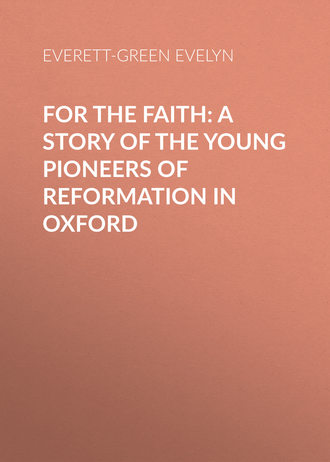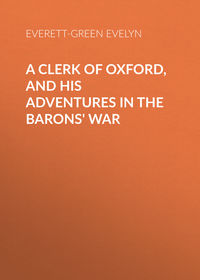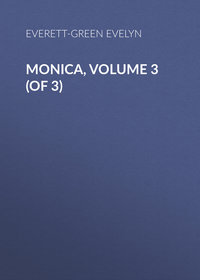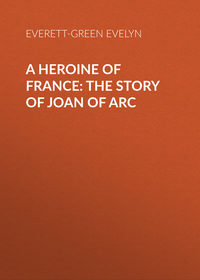 полная версия
полная версияFor the Faith: A Story of the Young Pioneers of Reformation in Oxford
Freda, her hands full of golden king cups, the sunshine of the morning lighting her fair face and deep, dark eyes, turned at the sound of the voice beside her, and met the burning glance of Anthony Dalaber.
"You go to see the burning of the books!" she said, speaking under her breath. "O Anthony, how canst thou? – the Word of God!"
"Better they should burn the insentient books than the men who preach the living Word!" spoke Anthony, suddenly putting out his hands and clasping hers. "Freda, there have been men burnt alive before this for speaking such words as we in Oxford whisper amongst ourselves. If such a fate should befall some of us here-should befall me-wouldst thou grieve for me?"
Her eyes dilated as she gazed at him.
"What are you saying?" she asked slowly. "Is there peril in this journey? Is there peril menacing you here in Oxford?"
"There is ever peril where men dare to think for themselves and to read forbidden books."
"Master Clarke says they are not forbidden of God or of His Holy Church."
"That may be so; but they are forbidden by men who speak in the name and power of the church," answered Anthony, "and with them lies the issue of life and death for so many. Freda, what would you do in my place? Would you forsake these paths which lead to peril, or would you pursue them fearlessly to the end-even, if need be, unto death?"
A sudden, intense light leaped into her eyes. She put forth her hand, which she had withdrawn gently from his ardent clasp, and laid it lightly upon his shoulder.
"It is not what I would do, what I would say, Anthony. The charge is given by the Spirit of God: 'Be thou faithful unto death, and I will give thee the crown of life.'"
He took her hand and kissed it passionately.
"That crown will I win, my Freda," he cried, "for I will be faithful unto death!"
There was a curious mingling of tenderness and admiration in the glance she bent upon him. He was a goodly youth to look at, tall and strongly knit in figure, upright as a young spruce fir, with a keen, dark-skinned face, square in outline and with a peculiar mobility of expression. The eyes were black and sparkling, and the thick, short, curling hair was sombre as the raven's wing. There was no lack of intellect in the face, but the chief characteristic was its eager intensity of ever-changing expression.
The girl facing him was as straight and almost as tall as he, but slender and graceful as a young deer. Her hood had fallen back from her chestnut locks, which glistened in the sunshine like burnished copper. Her eyes were of a curious tawny tint, not unlike the colour of her hair, and her complexion was delicately fair, just tinged with rose colour at the cheeks, but of a creamy pallor elsewhere. Her features were delicate and regular, and she, too, was remarkable for the look of intellect in the broad brow and deep, steadfast eyes.
Their expression at this moment, as they were fixed upon Dalaber, was one which thrilled him to his heart's core.
He had been filled with a passion of self renunciation inspired by her words. But as he gazed into her eyes, something more personal, more human, sprang up within him. He put his lips once more to the hand he held, and his voice shook as he said:
"Freda, I love thee! I love only thee!"
She did not answer. She did not withdraw her hand. Perhaps she had known this thing before Dalaber spoke the words. She stood before him, looking very earnestly and tenderly into his eyes. It was scarcely the look of a young maiden who is being wooed by the man she loves; and yet there was love in that unfaltering glance, and his heart leapt up as he saw it.
"I ask nothing yet, Freda!" he cried-"at least, I ask only the right to love thee! Let me continue to be thy friend, thy companion, as before. Let me see thee and speak with thee as of old. Be thou my star and my guardian angel. I ask no more. I am but a poor student yet, but I will be more one day. Others have said so beside myself. I will rise to fame and fortune. And thou-if thou dost love me, even a little-thou wilt wait, and see what I can do and dare for thy sweet sake!"
She smiled her full, gracious smile at him, and again laid a hand upon his shoulder.
"Be ever true to thine own noblest self, Anthony Dalaber," she answered, in her rich, musical tones-"be true to thy conscience and to thy friends. Be steadfast and true; and that not for my sake, but for His in whose holy name we are called, and to whose service we are bound. Be faithful, be true; and whether for life or for death, thy reward will be assured."
He gazed at her with a glow of rapture in his eyes.
"The reward of thy love?" he whispered breathlessly.
"That may well be," she answered; "but I was not thinking of that. Fix thine eyes rather on that crown of life which shall be given unto those who overcome."
"I will think of both," he answered, in an access of enthusiasm, "for God is our Father; He loves us. I fear not to take all good at His hand. Love to Him-love to thee-faithfulness to both. What more can heart of man desire than such an object to strive after?"
His earnestness could not be mistaken. She caught the reflex of his passionate devotion, and thrilled a little beneath his touch. He felt it in a moment, and caught her hands again.
"Give me a word of hope!" he cried. "Ah, my beloved, wilt thou not say that some day thou wilt love me?"
Freda was not one who would dally and trifle with her heart.
"In sooth, methinks I love thee now, Anthony. Nay, hear me a moment longer. I love thee with a strong and sisterly love; but I would know mine own heart better ere I promise more. We will be content with this knowledge for the nonce. I shall watch thee, Anthony; I shall hear of thee; I shall know what thou hast power to do and dare. But now let us say farewell, for I must carry my flowers within doors; and thou-it is time thou wert away. Thou hast a long journey to prepare for."
And so, with one kiss, gravely given and taken, the lovers parted, and Anthony went on his way as one who treads on air.
Some three days later, with eager eyes and bated breath, Anthony Dalaber was following his friend John Clarke up the landing stairs of a certain wharf in the city of London, and gazing earnestly about him at the narrow, dark street in which he found himself, where the shades of night seemed already to have fallen.
He knew whither they were bound-to the house of a priest, Thomas Garret by name, well known to Clarke, and known by name to Dalaber, too. He was one of the most active of the little band now engaged in the perilous task of receiving and distributing the translated Scriptures and the pamphlets issued by Martin Luther and other reformers. He was an ex-fellow of Magdalen College, now a curate of Allhallows, near Cheapside. Dalaber had often had a wish to see this man, having heard of him in many quarters.
And now they stood knocking at the door of his house, which opened only a few hundred paces from the riverside.
They had to wait some little time; but Clarke was not impatient, though he gave a peculiar knock more than once upon the door. Presently it was opened a very little way, and a voice asked:
"Who are you, and what is your errand?"
"Crede et manducasti 1," spoke Clarke, in a low voice; and at once the door was opened wider.
He stepped within, and Dalaber followed him. They found themselves in a very narrow entry hall, and could only see in the gloom that a serving man stood before them.
"Tell your master that John Clarke from Oxford has come to lodge with him for a few nights, if he can give him house room."
The man vanished, but almost immediately reappeared and beckoned to them to follow. He took them down some steps, lighting the way by a lantern; and after they had descended some score they reached a door, which he pushed open, revealing a roomy, cellar-like vault, in which some half-dozen men were busily employed; but so scanty was the illumination that Dalaber could not for the moment see upon what task they were bent.
One figure detached itself from the rest and came forward. Dalaber found himself gazing at a small, wiry-looking man in the frock of a priest, whose head was slightly bald in addition to the tonsure, and whose face was thin and lined, as though with vigils and fasting and prayer. It was the face of an ascetic-thin featured and thin lipped, pale almost to cadaverousness, but lighted as though with a fire from within.
The extraordinary power of the shining eyes riveted Dalaber's gaze from the first moment. Their glance was turned full upon him after the priest had given greeting to Clarke, and the thin, resonant voice asked quickly:
"Whom have you brought? Is he to be trusted?"
"To the death!" answered Dalaber, speaking for himself. "Try me, and you shall see."
"It is my young friend, Anthony Dalaber," said Clarke, his hand upon the youth's shoulder. "He is very earnest in the study of the Scriptures and in the desire for a better state of things within the church. Methinks he is stanch and true, else would I not have brought him. As we journeyed hither I told him of the work of the Association of Christian Brothers, and he would fain share their toil and peril."
"Is that so?" asked the priest, again shooting a fiery glance towards the young student. "Canst thou drink of the cup we may be called upon to drink, and share the fiery baptism with which we may be baptized withal?"
And Dalaber, his quick enthusiasm kindling to the spark which seemed to leap towards him from the other, answered without a moment's pause of hesitation, "I can."
Then Garret stretched forth his hand and took that of Dalaber in the clasp of brotherhood, and Anthony felt the magnetic thrill tingling through his whole frame.
"God be with you, my son, and keep you steadfast," said he; and the other men, who had left their tasks and come forward to greet Clarke and his companion, murmured a deep "amen."
Then all turned to the work in hand; and Dalaber saw that they were engaged in hiding beneath the flagstones of the cellar, which had carefully been removed for the purpose, a number of bales and packets, whose contents could easily be guessed at. The earth from beneath the stones had been hollowed out so as to receive these packets in a number of deep cavities; and when the flags were carefully replaced, and a little dirt and dust carefully sifted over the floor, it would require a practised eye to discern the hiding place. And hitherto it had passed undetected.
"We are hiding a number of books belonging to various brethren and confederates," spoke Garret, as the task went on. "By a providential warning our brother, Dr. Barnes, received timely notice of visitation at his house, and the books were hurriedly carried hither in the dead of night. You have heard, perhaps, of his arrest?"
"No," answered Clarke; "we have but just arrived, and the last fifteen miles we came by water in a wherry. The man knew naught of the talk of the town, save that a great burning of books is to take place on the morrow at Paul's Cross."
"Ay," spoke Garret, with a grim compression of the lips, "a mighty burning of forbidden books will take place there. But mark, my friends; had those books yonder been found in Dr. Barnes's house, not books alone but the man himself would have been burnt upon the morrow. The cardinal plainly told him so; and as it is, he has signed a paper which they call a recantation of heresy. Let us not judge him harshly. His friends pleaded, and his foes threatened, and the flesh shrinks from the fiery trial. He will read this confession or recantation tomorrow at St. Paul's, and help to fling the precious books upon the devouring flames.
"Ah me! Let us not judge him! Judge nothing before the time, till the Lord come. Oh, would that Ho would come Himself, to bring to an end this dark night of persecution and terror, and take the kingdom and the power and reign!"
And again the voices of the brethren answered, "Amen!"
"Are there any others who take part in this strange pageant on the morrow?" asked Clarke, after a brief pause.
"Yes; five honest fellows from the Stillyard, who have been detected in bringing books up the river and landing them. They are condemned to appear tomorrow, and to assist in the holocaust with their own hands. Being humbler men, they are dealt with more lightly; and men all agree in this, that the cardinal would rather persuade men to escape, and make the way easy for them to abjure what he calls their errors, than drag them to the stake. But he will not shrink from that last step, if he think the welfare of the church demands it; and there are others who bear a yet more cruel hatred towards all who would be free from the shackles of falsehood and superstition. And much power belongs to them. God alone knows what is coming upon this realm."
"But God does know; let that be enough!" spoke Clarke, with the quick lighting of his clear blue eyes which gave him such power over his hearers.
He and Garret were men of markedly contrasted types-the one all fire, restlessness, energy; the other calm, contemplative, intensely spiritual. Both were alike filled with a deep faith, a deep zeal; one the man of action, the other the man of meditation and devotion-yet deeply attached one to the other, as could be seen by the way they looked and spoke.
"Ay, verily, let that be enough; let us remember that the day must come that He who will come shall come, and shall not tarry. Let Him judge; let Him make inquisition for blood. Let our care be that we who are called and vowed to His service are found not called alone, but chosen and found faithful."
The brethren, having finished their work, and replaced the flagstones, spoke farewell, and departed one by one; but Clarke and Dalaber remained with their host, and one man besides, whose face was known to Anthony, and who also came from Oxford.
He was another of the cardinal's canons who had come from Cambridge with Clarke, and his name was Henry Sumner. Evidently he too was of the band of Christian Brothers; and in the long and earnest talk which lasted far into the night, and to which Dalaber listened with the keenest interest, he bore a share, although the chief speaker was Garret, upon whose lips Dalaber hung with wrapt attention, whilst Clarke's words fell softly like distilled dew, calming the heart, and uplifting the spirit into heavenly regions of light and peace.
Anthony Dalaber was the only one in that house who desired to behold the spectacle upon the morrow. Garret's brow was dark, and he spoke of passing the hours in fasting and prayer. Clarke had friends he wished to visit in the city; but Dalaber's curiosity burnt within him, and none dissuaded him from his plan. Indeed, it was thought a pious act by the authorities to witness such a scene, and might have been in one way advantageous to the young Oxford graduate to be seen at such an exhibition, if any chanced to observe him there. Not that Dalaber thought of this himself, but the elder men did; and though they would not have sought to win favour by such an act themselves, they were not sorry for a young confederate to take advantage of the possibility of notice from those in authority. It was wonderful how Argus-eyed and how long of arm were the emissaries of the orthodox party in the church in those times.
It seemed to Anthony himself as though all London were astir, and moving towards old St. Paul's, as he threaded the narrow streets towards the stately edifice. Although it wanted half an hour or more to the time when the ceremony should commence-eight o'clock in the morning the open place around the cathedral was packed when Dalaber reached it, and only by the good nature of a citizen, who took him into his house and let him view the scene from a window, was he able to see what passed.
A high platform was erected by the great western doors of "Paul's Walk" (some authorities say just within, and some just without the building), where the cardinal's throne, draped with purple, had been set, as well as seats for a great concourse of ecclesiastics beside. Opposite this platform was another and far humbler erection, evidently for the penitents; whilst over the north door, the Rood of the Northern, as it was called, a great gilt crucifix had been set up; and within the rails surrounding it burnt a fire, round which fagots were set, and great baskets containing the forbidden books, which were presently to be solemnly burnt.
As the great clock boomed out the hour of eight, two processions simultaneously approached the platform. One swept out through the cathedral doors in all the pomp of power and majesty, the cardinal in scarlet robes, blazing with gems and gold, attended by innumerable dignitaries-abbots and priors, bishops, deans, doctors, and lesser clergy, shining in damask and satin, a right goodly company. For a while all eyes were so fixed upon this glittering array that there was scarce time to note the humble six, in their penitential robes, bare-footed, and carrying tapers, who appeared, attended by their jailers from the Fleet Prison, and were set upon the opposite platform, full in view of all.
It was not Cardinal Wolsey, but Fisher, Bishop of Rochester, who delivered to them a fiery oration, descanting to them on the enormity of their offences, and calling upon them to abjure their hateful heresy. His ringing voice carried all over the open space, though Anthony Dalaber could only catch an occasional phrase here and there, which perhaps was as well. But the reply, if reply there were, from the penitents was quite inaudible, though Dr. Barnes was believed to have spoken a solemn recantation in the name of the six, and to declare that they only met the due reward of their sins.
Then came the final ceremony, the pacing round and round the fire, the casting into the flames, first the fagots, and then the books put ready for the burning. The people held their breath whilst this was being done; but had observant eyes been fixed upon many of the faces of the crowd, they would have seen looks of fierce hatred directed towards the spot where the powerful cardinal sat aloft, whilst eager hands seemed ofttimes to be stretched out as though to clutch at the precious books, now being ruthlessly consigned to the flames.
At last Anthony Dalaber could stand it no longer. Hastily thanking the honest citizen for the "goodly show" he had permitted him to witness, he slipped down into the street, and pushed his way through the throng anywhere, out of sight of the odious pageant of intolerance and bigotry which he had been witnessing.
"Had it been Luther's books only, I could have stood it. He is a man, and though a champion for truth, he may err, he does err. And he speaks wild words which he contradicts himself. But the Word of God! Oh, that is too much! To take it out of the hands of the poor and needy, who hunger to be fed, and to cast it to be burnt like the dung of the earth! Surely God will look down! Surely He will punish! Oh, if I had wanted argument and reason for the step I will take in the future, yonder spectacle would have been enough!"
For many hours he wandered through the streets and lanes of the city, so intent on his own thoughts that he scarce noted the buildings and fine sights he passed by. But his feet brought him back to the spot of the morning's pageant, and towards evening he found himself looking upon the ashes of what had been the books brought with so much risk by the Hanse merchants and the Stillyard men, and so eagerly desired by the poorer people of the city.
All the platforms had been removed. The crucifix no longer glittered overhead, the doors of the cathedral were shut, and none of the pomp of the morning could be seen here now. But several humble persons were raking amid the ashes where the books had been burnt, as though to see whether some poor fragments might not have been left unconsumed; and when they failed to find even this-for others had been before them, and the task of burning had probably been well accomplished-they would put a handful of ashes into some small receptacle, and slip it cautiously into pocket or pouch.
One man, seeing Dalaber's gaze fixed upon him, went up to him almost defiantly and said:
"Are you spying upon us poor citizens, to whom is denied aught but the ashes of the bread of life?"
Dalaber looked him full in the face, and spoke the words he had heard from Clarke's lips the previous evening:
"Crede et manducasti."
Instantly the man's face changed. A light sprang into his eyes. He looked round him cautiously, and said in a whisper:
"You are one of us!"
There was scarce a moment's pause before Dalaber replied:
"I am one of you-in heart and purpose, at least, if not in actual fact."
He paced home through the streets in a tempest of conflicting emotions. But his mind was made up. Come what might-peril, suffering, or death-he had put his hand to the plough. He would not look back.
"Be thou faithful unto death, and I will give thee the crown of life."
He seemed to walk to the accompaniment of these words; and when he reached Garret's house he went straight to the master, told his story, and knelt suddenly down before him.
"Bless me, even me also, O my father!" he exclaimed, in a burst of emotion to which his temperament made him subject, "for I would now be admitted as member of the Association of Christian Brothers."
Chapter III: A Neophyte
"And the soul of Jonathan was knit to the soul of David, and he loved him as his own soul."
These words often came into the mind of the priest, Thomas Garret, during the three days which Anthony Dalaber spent at his house, hard by the rushing river, in the city of London.
There were ten years in age between them. Dalaber was a youth who had seen little of life beyond what he had learned in Oxford, whereas Garret had already passed through strange and perilous experiences. The one had so far lived amongst books, and with youthful companions of his own standing; the other had been a pioneer in one of the most dangerous movements of the day, and had seen what such courses might well lead him to. Storm and stress had been the portion of the one, a pleasant life of study and pleasure that of the other. It was only during the past six months that association with Clarke and some others of his way of thinking had aroused in Dalaber's mind a sense of restless discontent with existing ordinances, and a longing after purer, clearer light, together with a distaste and ofttimes a disgust at what he saw of corruption and simony amongst those who should have been the salt of the earth.
Had it not been for the talks he had heard of late, in Dr. Langton's house, he might have passed through his divinity studies at Oxford as his brother had done before him, content to drift with the stream, ignorant of the undercurrents which were already disturbing its apparently tranquil surface, and ready in due course to be consecrated to his office, and to take some benefice if he could get it, and live and die as the average priest of those times did, without troubling himself over the vexed questions of papal encroachment and traffic in pardons and indulgences which were setting Germany in a flame.
But he had been first aroused by seeing the light in Freda's eyes as these questions had been discussed in the hearing of her and her sister. From the first moment of his presentation to Dr. Langton's family Dalaber had been strongly attracted by the beautiful sisters, and especially by Freda, whose quick, responsive eagerness and keen insight and discrimination made a deep impression upon him. The soundness of her learning amazed him at the outset; for her father would turn to her to verify some reference from his costly manuscripts or learned tomes, and he soon saw that Latin and Greek were to her as her mother tongue.
When she did join in the conversation respecting the interpretation or translation of the Holy Scriptures, he had quickly noted that her scholarship was far deeper than his own. He had been moved to a vivid admiration at first, and then to something that was more than admiration. And the birth and growth of his spiritual life he traced directly to those impulses which had been aroused within him as he had heard Freda Langton speak and argue and ask questions.
That was how it had started; but it was Clarke's teaching and preaching which had completed the change in him from the careless to the earnest student of theology. Clarke's spirituality and purity of life, his singleness of aim, his earnest striving after a standard of holiness seldom to be found even amongst those who professed to practise the higher life, aroused the deep admiration of the impulsive and warm-hearted Dalaber. He sought his rooms, he loved to hear his discourses, he called himself his pupil and his son, and was the most regular and enthusiastic attender of his lectures and disputations.









